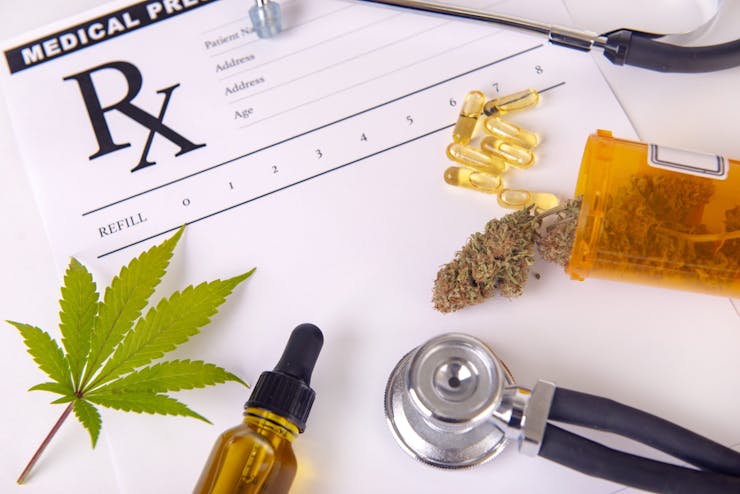Medical cannabis in Canada has been legal since 2001, long before an adult-use retail market came to be. But more than two decades later, there are still many misconceptions and questions about it.
The Cannabis Act came into force on October 17, 2018. Since that date, new regulations have replaced the Access to Cannabis for Medical Purposes Regulations (ACMPR).
Patients should know medical cannabis isn’t regulated the same way prescription medications are. There is no such thing as a “medical marijuana card” in Canada. There is nolonger a physical card to carry and patients do not have to register with Health Canada (unless they are growing).
In Canada, a place that will sell you cannabis directly is not a clinic. It’s a dispensary.
In most cases, you can’t just walk into your family doctor or go to a pharmacy. Instead, individuals can self-refer to a doctor who specializes in medical cannabis and register with as many mail-order providers (licensed producers) as they need, free of charge.
Since cannabis retail stores are plentiful, some patients don’t feel the need to see a doctor for their cannabinoid treatments. However, there are many advantages to using cannabis prescribed by a healthcare practitioner who is knowledgeable about its therapeutic uses.
Why get a medical cannabis authorization instead of shopping in retail stores?
- Physician guidance: When you’re prescribed cannabis, your treatment plan is tailor-made for you, taking into account your health issues, current medications, and level of comfort with cannabis. That takes the guesswork out of choosing the right dose, strain, or product.
- Workplace protections: A growing number of workplace insurance providers are covering medical cannabis used to treat conditions ranging from rheumatoid arthritis to multiple sclerosis and cancer.
- Tax deductions: Cannabis purchased through a licensed provider can be claimed as a medical expense on personal taxes. The provider must be on a Health Canada-approved list of medical practitioners.
- Higher possession limits: The limit for buying and possessing recreational cannabis outside your home is 30 grams, but the law is different for prescribed cannabis. Because it’s considered a medicine, you’re allowed to possess 30 times your daily prescription limit or 150 grams, whichever is less.
- Personal protection: Many people who use cannabis for a medical purpose related to a disability are legally protected from discriminatory treatment in employment, housing, services and other areas. (Those who seek accommodation related to cannabis use because of a disability are often required to provide medical or other information to support their case.)
- Compassionate pricing: People who are living on disability or are receiving aid from government subsidy programs are often eligible for compassionate pricing—which is a discount on producers’ cannabis products. Discounts commonly range from 10% to 30%.
The important role of medical cannabis doctors and clinics
If you are using cannabis to treat certain conditions or side effects, it is wise to consult with a doctor who understands cannabinoid treatment, as well as any interactions with prescription medications. The majority of medical cannabis patients in this country started their journey at an authorized clinic.
Contact one of the many specialty clinics that act as middlemen between doctors, patients and licensed producers. These clinics set up consultations with physicians who assess candidates for medical cannabis suitability and then write prescriptions (i.e. medical documents) for those who are suitable.
These clinics also educate patients on how to use cannabis and register them with licensed producers, who then send the cannabis by mail. A patient can register with more than one licensed producer at a time but a separate medical document is required for each one.
Things a medical cannabis clinic should never do
- Push patients to choose certain brands or products
- Require urine tests
- Charge to renew your authorization or change providers between renewals
- Limit the number of providers you can choose
- Cap how much THC you can use (without cause)
- Revoke your medical document for purchasing cannabis from a retail store
- Force you to share medical information with non-healthcare personnel at the clinic
Medical clinic or dispensary? How do I know if a doctor is legitimate?
Since medical cannabis isn’t treated like other medications in Canada, patients need to seek out clinics and doctors themselves. Ashleigh Brown, CEO of SheCann, and a well-known medical cannabis patient and advocate urges consumers to be mindful of the fact that licensed producers sell cannabis to patients who have prescriptions from authorized healthcare providers.
“Access to medical cannabis is easier than ever,” says Brown. “Patients have a lot of choice in how to proceed with treatment — through authorized cannabis clinics or individual healthcare providers — so they should educate themselves about their options and their rights.
Alarm bells should sound in your head if a clinic can’t help you get medical cannabis directly from a licensed producer. Also, “if a place is promoting a product and promising to send it to you, it’s not a legitimate clinic,” Brown says. “Clinics aren’t allowed to send or sell cannabis.”
How do I choose a producer to order medical cannabis from?
Many clinics will recommend one or more mail-order providers but ultimately the patient has the final say.
“It’s often hard to decide,” concedes Brown, who takes cannabis to treat epilepsy. “If you’re unsure which producer would best meet your needs, get several medical documents then do some research. I’ve had as many as nine of those documents at one time.”
“It’s not always easy but it’s important,” she says. “What matters most is getting an experienced doctor or nurse practitioner who will give you a detailed treatment plan with product suggestions.”
Where to find a medical cannabis-informed doctor
Ekosi Health
Winnipeg-based Ekosi specializes in delivering personalized cannabis therapies for a wide range of medical conditions. It operates in Ontario and Manitoba and is run by Dr. Shelley Turner, a primary care physician who is considered a trailblazer in the use of medical cannabis for addiction, sleep and mood disorders and chronic pain.
Harvest Medicine
Harvest Medicine is a network of specialty medical cannabis clinics. The Calgary-based company provides in-person services in four locations in Alberta and the Maritimes and through a telemedicine platform called HMED Connect.
Santé Cannabis
Santé Cannabis offers frontline services to patients in four locations in Quebec and through telemedicine. The company, which is based in Montreal, is recognized for offering clinical development and research services.
The Herb Clinic (THC)
Located in St. Albert, the Herb Clinic (THC) provides a variety of services in the Alberta market, including cannabis prescriptions, education and data collection. It has created a community platform for patients and also provides services to those who grow their own cannabis, legally, at home.
Register with Health Canada to legally cultivate your own medical marijuana
- ordinarily, live in Canada
- be 18 years of age or older
- attest that you have not been convicted of a cannabis-related offence
- not be registered more than once at any time
In order to grow your own medical supply of cannabis, you need to submit an application to Health Canada. Patients can grow more than 4 plants per household, the adult-use limit in most provinces, the total number of plants depends on your authorization of grams/day.
If math isn’t your thing, Health Canada has a calculator to determine your plant threshold. If you are authorized to produce cannabis for yourself, you may also be authorized to produce for one other person if you are their designated person.








